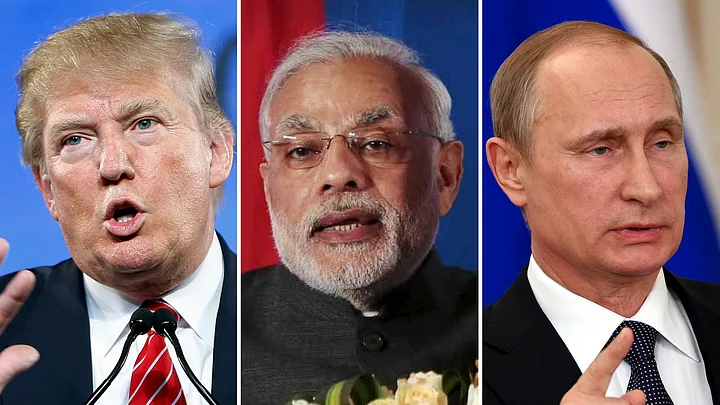“A week is a long time in politics,” the then Prime Minister of UK Harold Wilson had said in 1964.
Since US President Donald Trump’s embrace of Russia’s President Vladmir Putin on Friday in Alaska, global politics is seeing rapid machinations with strange bedfellows becoming allies across the world.
It began when Trump’s meeting with Putin saw no breakthrough and the US president decided to meet Ukrainian President Volodymyr Zelensky the following Monday, that sent European leaders into a huddle, anxious that Zelensky would not get the same friendly treatment, with memories of their previous meeting at the Oval Office in February.
“It is clear that the outcome of the Alaska summit has risen concerns in Europe, as Trump seems to have bought a large portion of Putin’s argument.”Camille Grand, a former top NATO official who has been in touch with senior European officials involved.
Shifting Strategies and Uneasy Diplomacy
The world was watching. Trump abandoned his threat of immediate sanctions on Russia and shifted away from seeking an immediate ceasefire to a comprehensive deal, adopting language close to Putin’s to talk about the end to the fighting.
India was hopeful, having been slapped with a 50 percent tariff by the US. European leaders of the Coalition of the Willing rushed to the US to support Zelensky and help prevent any flare-ups, while convincing Trump to include Europe in any further talks.
Clearly, the travelling European heads of government—plus EU and NATO leaders—wanted to not just avoid confrontation, but also capitulation. It takes a lot for heads of states to change their schedules at short notice, especially in August when several are on holiday. French President Emmanuel Macron was enjoying water sports on the Riviera, Italian leader Giorgia Meloni was in Greece.
Trump’s change of strategy after the red-carpet welcome to Putin, seen as a potential threat to the long-term security of Europe, made it inevitable for European leaders to change their plans and head to the US.
Now the White House is planning for a possible trilateral meeting between the US, Russian and Ukranian presidents in the Hungarian capital of Budapest. Hungarian Prime Minister Viktor Orbán is known to be close to Trump since the American president’s first term in office and he is also close to Putin.
Hungary may be an uncomfortable choice for Ukraine, given the 1994 Budapest Memorandum, during which the US, the United Kingdom and Russia promised to uphold Ukraine’s independence, sovereignty and respect for its border in exchange for relinquishing its nuclear weapons.
Putin’s 2014 assault on Ukraine proved the agreement meaningless when none of the signatories provided military forces to counter the attacks.
Macron suggested Geneva as the ideal meeting spot and the Swiss foreign minister promised “immunity” to Putin for an outstanding war crimes’ warrant if the nation known for neutrality was chosen for peace talks. Putin told Trump he preferred Moscow. Apparently now, it will be a bilateral meeting between Putin and Zelensky followed by a trilateral with Trump. So, there is still many a slip between the cup and the lip.
From Sanctions to Summits
On the other hand, while details are evolving, reportedly, Chairman of the Joint Chiefs General Dan Caine hosted his military counterparts from Germany, the UK, France, Finland and Italy in Washington late Wednesday to begin discussions on security guarantees and how to implement them. The 32 NATO defense chiefs also met virtually.
Strange are the ways of politics. While Trump has softened his stance on sanctions against Russia since the two leaders met in Alaska, there has been no reprieve for India. Instead, White House trade adviser Peter Navarro says India’s purchase of Russian crude oil are funding Moscow’s war in Ukraine and has to stop, as Washington continues to pressurise India to cut off its energy imports from Russia.
Writing in the Financial Times, Navarro said, “India is a global clearinghouse for Russian oil” and that India’s dependence on Russian crude is “opportunistic and deeply corrosive of the world’s efforts to isolate Putin’s war economy.”
The question is, is India being scapegoated, and if so, why? Several experts say the president’s trade war is increasingly being wielded as a ‘political cudgel’, in lieu of more traditional forms of diplomacy.
India has been unable to reach a trade agreement, and Trump appears ready to follow through with his threat to impose a further 25 percent tariff on Delhi—bringing the total to 50 percent—the joint highest levy on any country, along with Brazil. It has put to question the years-long bipartisan effort to deepen ties with India as a geopolitical counterweight to China. Strangely enough, this week the White House Press Secretary Karoline Leavitt spoke about “sanctions” on India instead of “tariff”.
In the case of Brazil, which has a rare trade surplus with the US, Trump has said that the huge 50 percent tariff is due to the trial of his political ally, Jair Bolsonaro, who is charged with plotting a military coup after he lost the 2022 presidential election.
For India it is a question worth asking: Is Indian foreign policy undergoing a radical change?
With Indian Prime Minister Modi’s scheduled visit to Shanghai and Putin’s plans to visit India, is this a pattern of tightening relations between the BRICS countries? Has India-US diplomacy failed? Did the domestically confident government outsource its diplomatic lobbying? Or, is there a personal rift between Trump and Modi?
In these times of fast changing global geopolitics one can only remember what the Liberal politician Joseph Chamberlain said in 1886: “In politics, there is no use in looking beyond the next fortnight.”
(Nabanita Sircar is a senior journalist based in London. She tweets at @sircarnabanita. This is an opinion piece, and the views expressed above are the author’s own. The Quint neither endorses nor is responsible for the same.)
